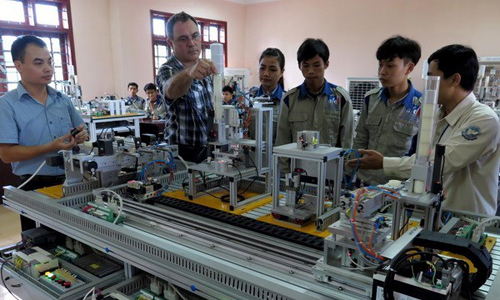Vietnam could lose 5 million jobs to robots by 2020: ILO
ABO/VNA – Vietnam could lose 5 million jobs to automation by 2020.
 |
| An industrial electricity class of a vocational school (Photo: VNA) |
The International Labour Organisation (ILO) made the alarming proclamation in the context of the rise of Industry 4.0 and Vietnam’s lack of human resource quality.
Lao dong (Labour) newspaper noted the ILO rankings in which the quality of Vietnamese workforce was given 3.79 out of 10 points, ranking 11th among the 12 listed Asian countries, while the workforce’s competitiveness received only 4.3 points. Additionally, the rate of trained labourers was only slightly more than 20 percent in 2015.
A large proportion of the country’s workers also lack soft skills like foreign languages, IT and teamwork skills.
The ILO said the textile-garment and footwear sectors, which employ a large number of manual workers, will be the most vulnerable in Industry 4.0. Meanwhile, other jobs like drivers, builders, processing workers and mechanics also face the risk of being replaced by robots.
Vu Quang Tho, Director of the Institute for Workers and Trade Unions of the Vietnam General Confederation of Labour, said businesses always seek profit, so when they realise the advantages of machines, they will replace their workers with robots.
He said it is necessary to improve workers’ skills so that when modern machinery is installed, they will be able to operate new equipment. The State should also have good welfare policies for labourers.
A study released in late 2017 by the consulting firm McKinsey suggested that up to 800 million individuals around the globe could be displaced by automation by 2030.
A report unveiled last April by the Paris-based Organisation for Economic Cooperation and Development (OECD) also found that 14 percent of jobs in developed countries were highly automatable, while a further 32 percent of jobs were likely to experience significant changes to the way they were carried out.
(Source: VNA)
 về đầu trang
về đầu trang







